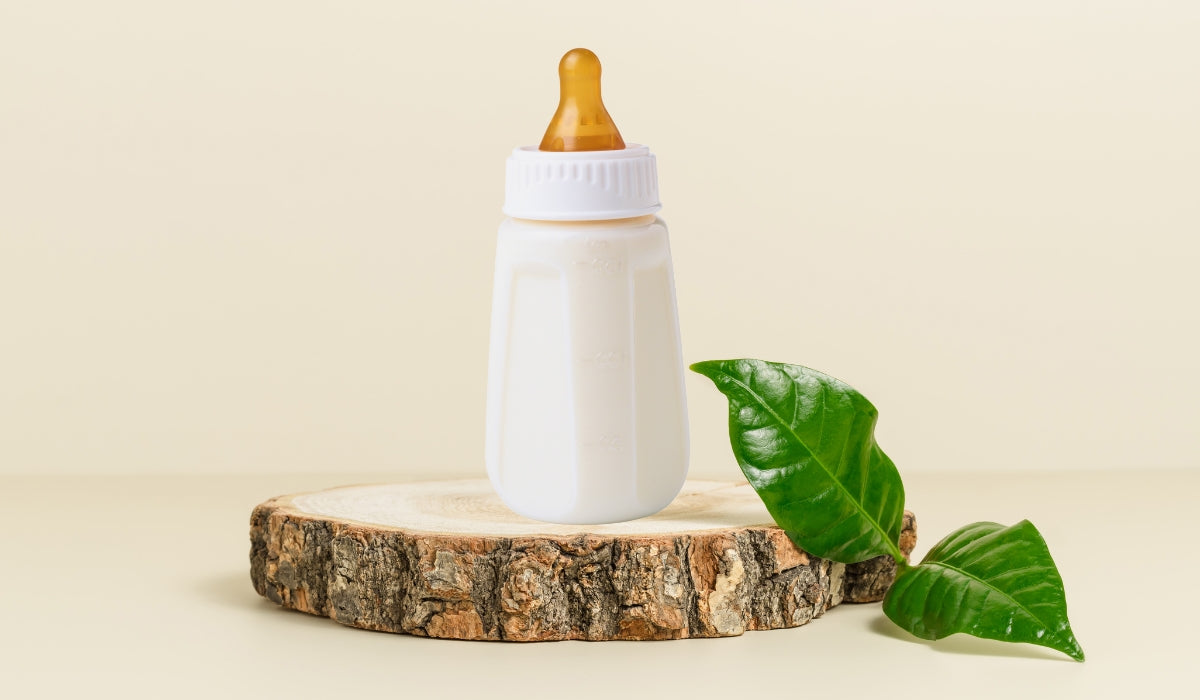As infant nutrition science and formula feeding have evolved and advanced, many parents find themselves confronted with yet another consideration to account for when feeding their little ones, namely, deciding between organic formula vs. regular formula.
But are organic formulas worth the price, and what makes them truly organic? Is organic milk better than conventional baby formula, or is this all just a clever marketing trick? If any of these questions have gone through your head, look no further.
These are the questions we will be answering today! Keep reading as we unravel the key differences between organic formula vs regular infant formulas so you can make an informed decision on which path to follow on your feeding journey.
Contents
- Comparing Organic and Regular Baby Formulas: Key Differences
- USDA Organic Certification Requirements
- Iron Content Requirements in Europe and The United States
- The Cost Factor: Is Organic Baby Formula Worth the Price?
- Top European Organic Formula Brands
- Frequently Asked Questions About Organic vs Regular Baby Formula
- Wrapping Up: Organic Formula vs Regular
Comparing Organic and Regular Baby Formulas: Key Differences
Organic and conventional infant formulas, both in the USA and EU, have distinct differences due to the methods of production, ingredients used, and regulatory standards.
Here's a breakdown of the key differences in each region:
USA - Organic vs. Conventional Formula:
1. Production & Farming Methods 👩🌾:
-
Organic 🌿: Ingredients are sourced from farms that avoid synthetic pesticides, herbicides, and genetically modified organisms (GMOs). These farms also employ more sustainable farming practices and focus on soil health.
-
Conventional: May use ingredients from farms that employ synthetic fertilizers, pesticides, and might not have restrictions on GMOs.
2. Animal Welfare 🐮:
-
Organic 🌿: Dairy-based formulas (if using cow’s milk) must come from cows that have access to pasture and are raised without the use of hormones or antibiotics.
-
Conventional: There are no strict guidelines regarding pasture access. Antibiotics and growth hormones can be used more freely.
3. Additives ➕:
-
Organic 🌿: Restricts certain synthetic additives and favors natural or organic alternatives.
-
Conventional: Might contain a wider range of additives and synthetic nutrients.
EU - Organic vs. Conventional Formula:
1. Production & Farming Methods 👩🌾:
-
Organic 🌿: The EU has stringent organic standards. The use of chemical synthetic pesticides and fertilizers is strictly limited, and GMOs are prohibited in organic farming.
-
Conventional: Might use synthetic fertilizers and pesticides and may contain GMOs. However, the EU has stricter regulations on fertilizers, pesticides, and GMOs than the US.
2. Animal Welfare 🐮:
-
Organic 🌿: Cows producing milk for organic formulas must have high welfare standards, including access to open pastures and a diet of organic feed. The use of antibiotics is strictly limited to when it's deemed medically necessary for animal health, and hormones are prohibited.
-
Conventional: Less stringent animal welfare standards than organic. However, the EU has overall higher animal welfare standards compared to other parts of the world.
3. Additives ➕:
-
Organic 🌿: The EU restricts many synthetic additives in organic formulas and emphasizes natural ingredients.
-
Conventional: May contain a broader range of additives, though the EU has stringent safety and health regulations.
Shared Points in Both Regions:
-
Nutrition: Both organic and conventional formulas in the US and EU are designed to meet the complete nutritional needs of infants. This includes essential vitamins, minerals, fats, and proteins.
-
Regulations: Both types of formulas, regardless of being organic or conventional, must adhere to strict regulations to ensure safety and nutrition for infants.
In choosing between organic and conventional formulas, parents often consider factors like farming practices, additives, and environmental impact. However, regardless of the choice, it's always essential to consult with a healthcare provider or pediatrician to ensure the formula meets the specific needs of your little one.
USDA Organic Certification Requirements
The U.S. Department of Agriculture (USDA) has guidelines for how ingredients are grown and processed. The regulations apply to soil quality, pest and weed control, animal-raising techniques, and the inclusion of additives in the product. The USDA organic label has four main categories that help consumers understand the degree of organic content in the product.
Here's a Quick Overview of the 4 USDA Organic Labels:
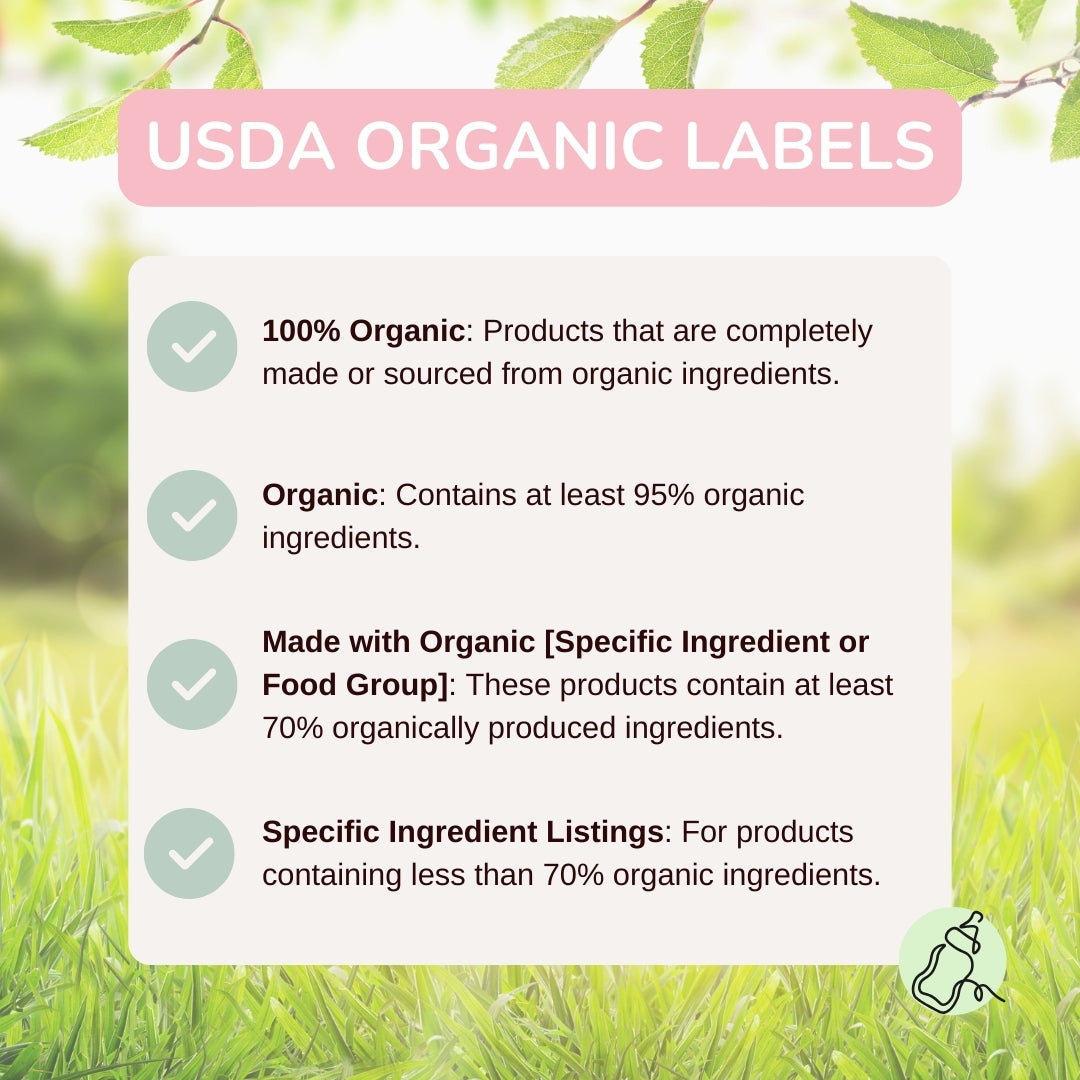
1) 100% Organic: Products that are completely made or sourced from organic ingredients. They can use the USDA Organic Seal.
2) Organic: Contains at least 95% organic ingredients. The remaining 5% (non-organic) must be from the USDA’s approved list. These products can also display the USDA Organic Seal.
3) Made with Organic [Specific Ingredient or Food Group]: These products contain at least 70% organically produced ingredients. The remaining 30% can be non-organic but must be produced without using excluded methods, like genetic engineering. They can't use the USDA Organic Seal but can list up to three organic ingredients or ingredient categories on the main display panel.
4) Specific Ingredient Listings: For products containing less than 70% organic ingredients. They can't use the USDA Organic Seal nor the word 'organic' on the main display panel. However, they can identify specific ingredients that are USDA-certified as organic in the ingredient list.
FDA Regulations for Organic Infant Formula
The Food and Drug Administration (FDA) also has its own requirements for certified organic infant formula regarding its nutritional value. This means that there is a strict list of essential nutrients that must be present in organic milk.
However, it should be noted that some of the required nutrients in organic baby formula can only be created using synthetic methods such as taurine, lutein, and L-Carnitine, among others. Moreover, while these ingredients are deemed safe in America, they are banned in the European Union (EU).
The European Commission has more regulations on formula than the FDA, meaning it is also more strict when it comes to organic formula production and composition. For instance, milk-based European formulas are not allowed to contain certain added sugars (corn syrup solids, for example), unlike many American brands.
Iron Content Requirements in Europe and The United States
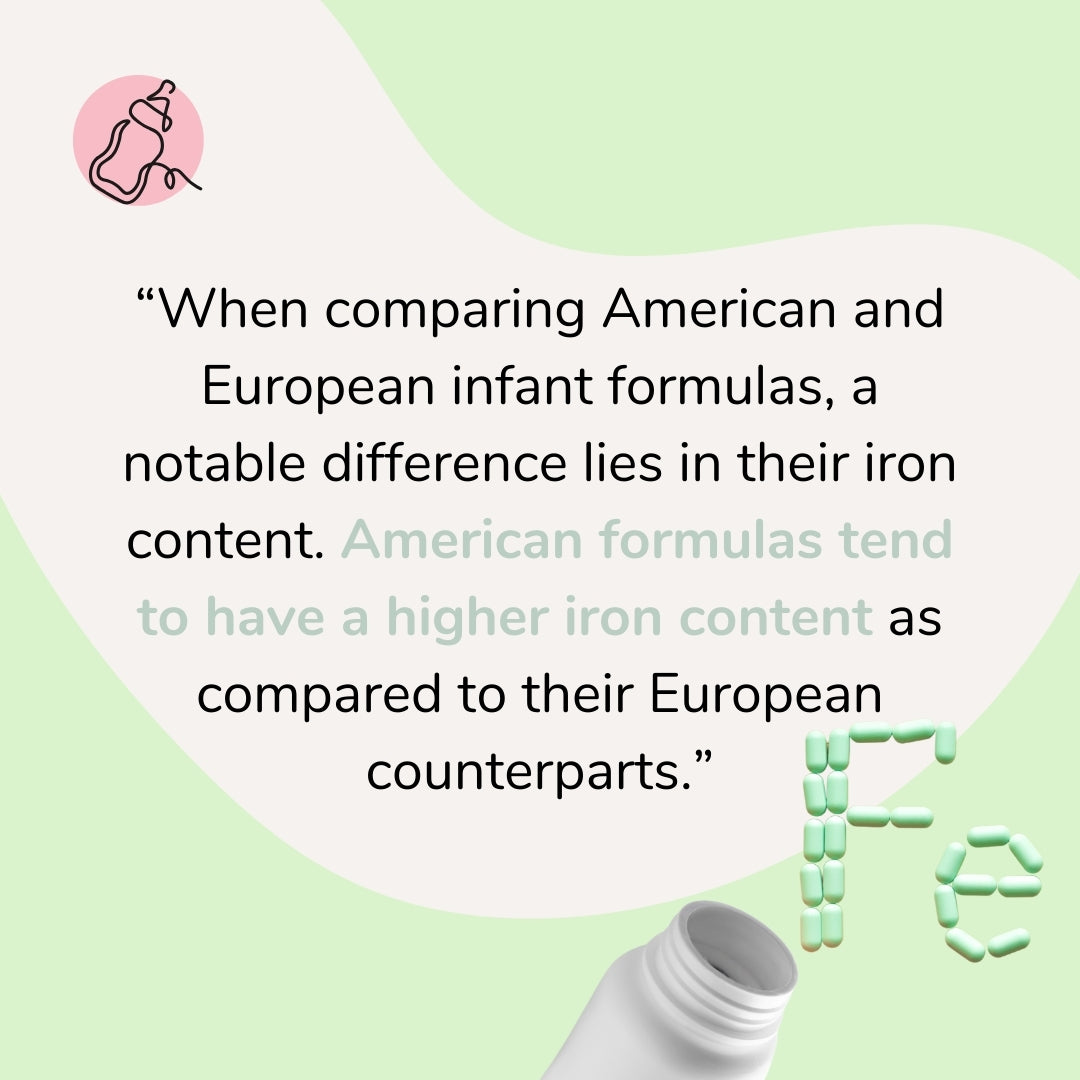 Iron is a crucial mineral for a baby's growth, aiding in the development of their brain and preventing anemia. However, like many nutrients, it's a delicate balance: too little can lead to deficiencies, but too much can pose its own set of problems.
Iron is a crucial mineral for a baby's growth, aiding in the development of their brain and preventing anemia. However, like many nutrients, it's a delicate balance: too little can lead to deficiencies, but too much can pose its own set of problems.
When comparing American and European infant formulas, a notable difference lies in their iron content. American formulas tend to have a higher iron content as compared to their European counterparts. So, why this difference?
Well, in the U.S., the FDA has established minimum levels of iron content in infant formula, with an emphasis on preventing iron-deficiency anemia. This condition can impact a baby’s growth and cognitive development, so the higher iron content in U.S formulas is meant to act as a preventive measure.
On the other hand, EU regulations permit a slightly lower iron level in infant formulas. This is based on the belief that while iron is essential, a modestly reduced amount can meet a baby's needs without the risk of overconsumption.
Excessive iron intake can cause gastrointestinal issues in babies, such as constipation, and may affect the absorption of other vital minerals. Thus, while both American and European formulas aim to provide a balanced iron content, European formulas lean more towards ensuring that babies don't consume too much iron.
The Cost Factor: Is Organic Baby Formula Worth the Price?
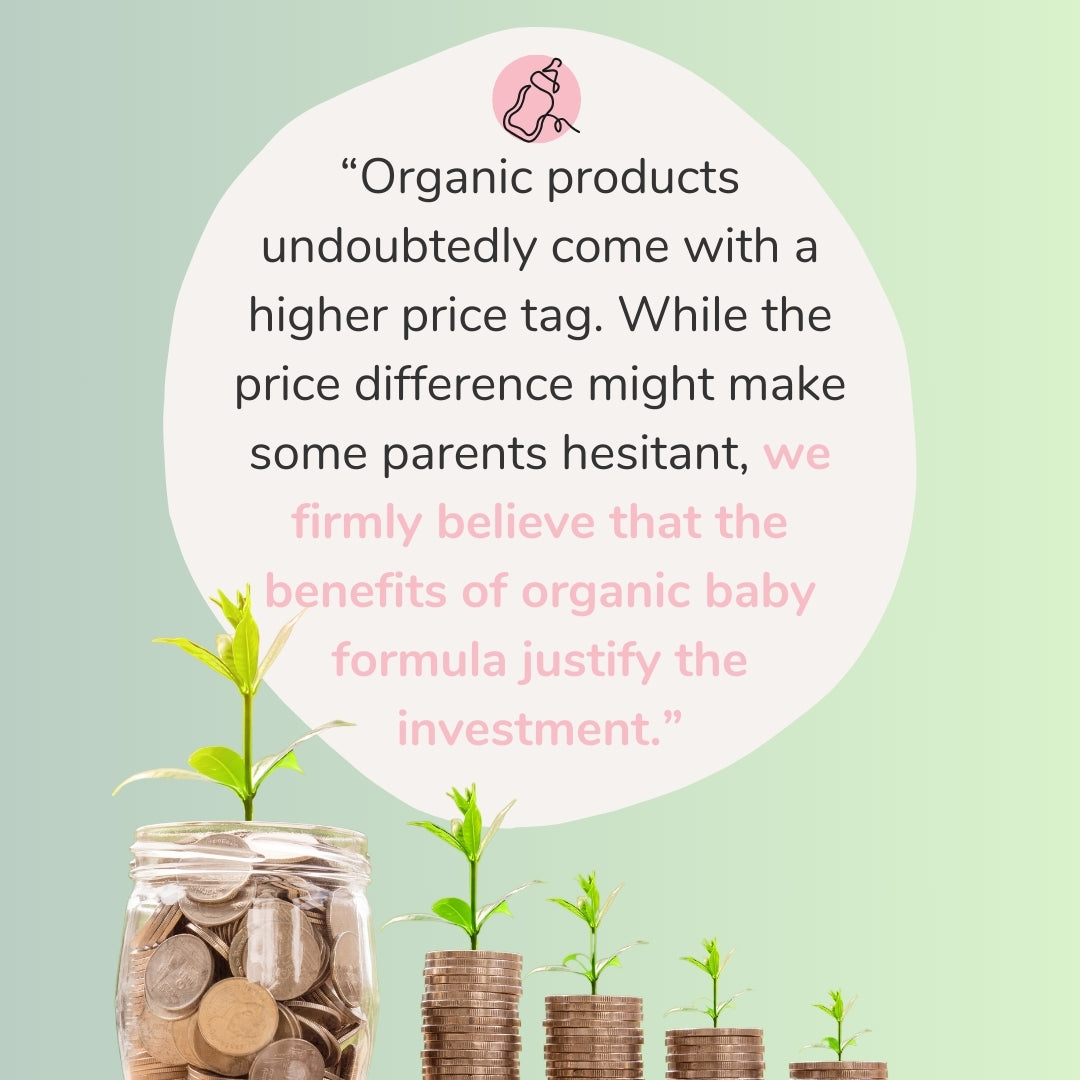 Organic products, including baby formula, undoubtedly come with a higher price tag. This increase in cost isn't arbitrary; the organic label reflects the premium, safe ingredients and the additional efforts invested in producing organic foods. While the price difference might make some parents hesitant, we firmly believe that the benefits of organic baby formula justify the investment.
Organic products, including baby formula, undoubtedly come with a higher price tag. This increase in cost isn't arbitrary; the organic label reflects the premium, safe ingredients and the additional efforts invested in producing organic foods. While the price difference might make some parents hesitant, we firmly believe that the benefits of organic baby formula justify the investment.
Top European Organic Formula Brands
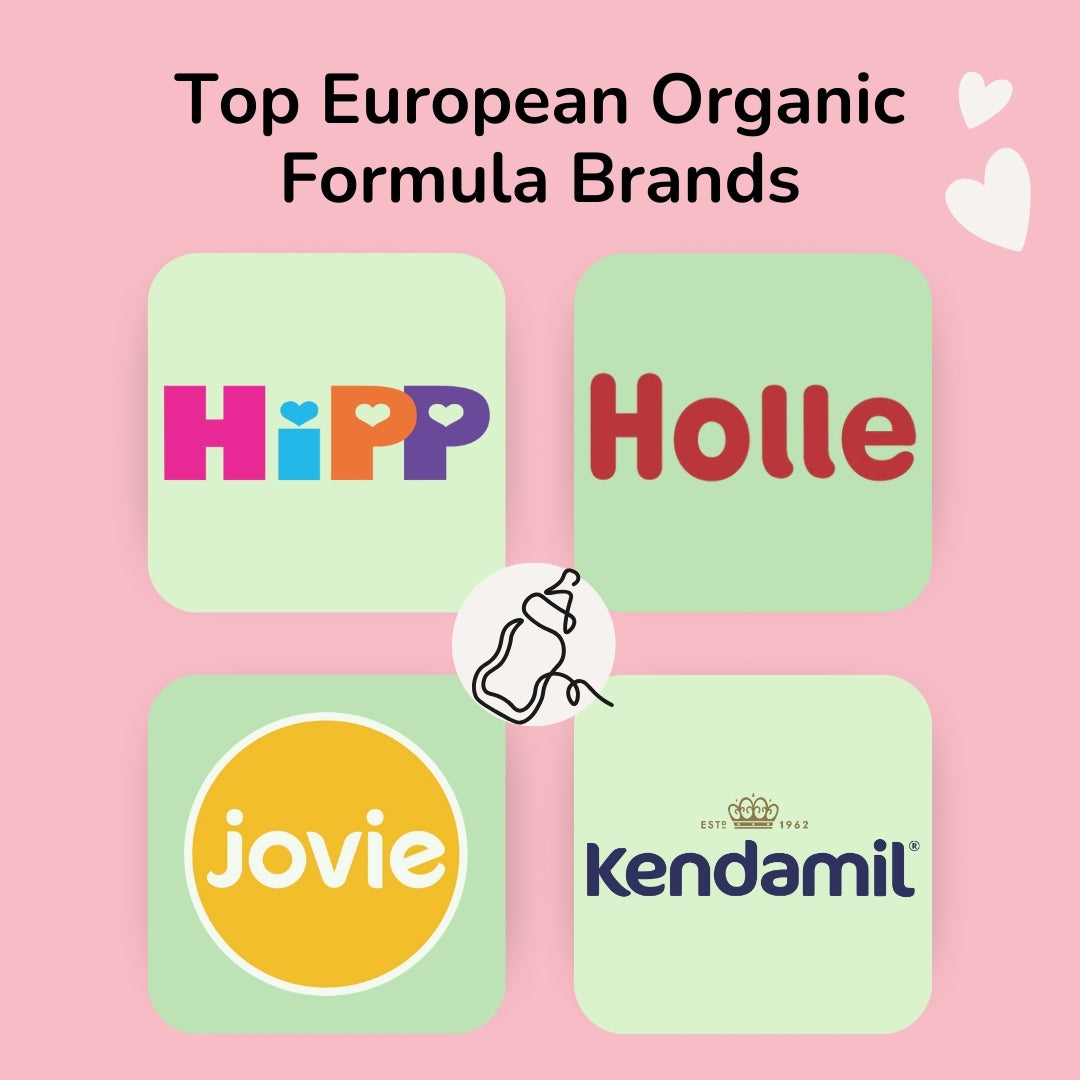
Are you eager to delve into the world of European organic baby formulas? You're in the perfect spot! Join us as we navigate through top-tier brands and highlight their exceptional products:
HiPP
HiPP makes a wide range of baby products, including cow, goat, hypoallergenic, comfort, and anti-reflux formulas. This brand strives to make organic formulas that are as close to human milk as possible. As such, many of their formulas are made with probiotic lactic acid cultures originally extracted from real breast milk to support your little one's gut health and digestion!
Holle
Holle produces organic cow and A2 cow's milk formulas as well as goat milk baby formula. A2 cow's milk and goat milk formula are easier on the tummy thanks to their gentler protein structure, making it a great option for babies with mild sensitivities. Holle is unique because, in addition to offering EU organic baby formula, many of their products also hold the Demeter label, which is a private certification with the highest organic standards in the world!
Kendamil
Kendamil offers full cream cow's milk formula in both organic and classic varieties that are palm and fish-oil-free. A special feature of Kendamil Organic is that their formula contains naturally occurring Human Milk Oligosaccharides (HMOs).
HMOs are a unique component naturally found in breast milk, vital for a baby's gut health and immunity. Kendamil, leading the way in baby nutrition, enriches their formulas with a special prebiotic blend to ensure your little one benefits from naturally occurring HMO content. Standout fact? Kendamil is the sole producer of organic formula infused with this incredible HMO advantage!
Jovie
Jovie stands out as a premium formula brand rooted in the nutritional power of whole goat milk. Jovie's commitment to quality extends to their unique processing method, ensuring the formula is naturally easy to digest and rich in essential nutrients, offering parents a pure and wholesome option for their little ones.
Curious to discover other popular European formula brands like Nannycare and Lebenswert Bio? Dive into our specially curated range at Baby Milk Bar. We've handpicked the best organic baby formulas for discerning parents like you. Easy to browse and trusted by many, discover the perfect formula for your little one's nutritional needs!
Frequently Asked Questions About Organic vs Regular Baby Formula
Does organic formula provide better nutrition than regular formula?
Not necessarily. Organic and non-organic formulas are quite similar in terms of nutrients. The only difference typically lies in the quality and sourcing of the ingredients.
Are there any risks associated with using regular formula?
Non-organic baby formula is considered safe as it must abide by strict safety and nutritional regulations. The downside of regular formula is that some synthetic ingredients may not be tolerated well by certain. Furthermore, the use of added sugars may increase the risk of obesity or diabetes later in life.
Can organic formula help reduce the risk of allergies or other health issues?
The use of hypoallergenic specialty formulas with the recommendation of your pediatrician can help manage allergy symptoms in babies.
How can I be sure I'm choosing a high-quality organic formula?
Choose formulas from reputable brands with high-quality ingredients, with recipes suited to your baby's unique needs and always with the guidance of your pediatrician.
Wrapping Up: Organic Formula vs Regular
Organic infant formula is highly regarded for its clean ingredients, though conventional formula is also deemed safe. Choosing the right formula is a balance of your baby's needs, the benefits of going organic, and your budget. Always consult with a pediatrician for tailored advice.
For the finest selection of premium European standard formulas, explore Baby Milk Bar. We're here to support you and your baby on your feeding journey. Dive into quality with us!
Breast milk is the best source of nutrition for babies. Before altering your baby's diet or feeding routine, consult your healthcare provider for personalized recommendations. The information in this article is strictly for informational purposes and is not a substitute for medical advice.


